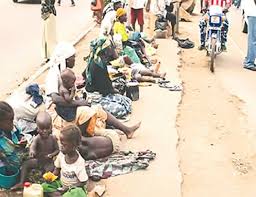Beggars in Lokoja, capital of Kogi state, north central Nigeria, on Sunday decried declining alms from members of the public to them, tracing that to the unabated harsh economic reality in the state and Nigeria at large.
The beggars,who expressed biter experiences they are passing through in the current economic quagmire, described their condition of living as “terrible”.
Speaking with our correspondent at the old market, Lokoja, Malam Abubakar Alli, expressed concern that he and his colleagues in the alms business no longer make enough money to feed,their dependants and take care of other essential needs to keep life moving.
Speaking in low tune, Alli said:”Few years back, I could boast of making N1,500 to N2,000 a day from begging, but for the past one year or so, I hardly make up to half of that amount for the same period. “Same goes for most ,if not all, of my colleagues in Lokoja.
Another beggar, Mohammed Adamu said that most he prayers he and his colleagues said to members of the public,towards attracting alms from them usually fall on deaf ears.
Adamu, who disclosed that he lost his sight many years ago, said he had been finding it very difficult to cope with life now a days due to abysmal diminishing earning from begging.
“We are not able-bodied members of the society where we can engage in meaningful physical work that can bring money to our pocket.
“As persons with disabilities,we depend, solely, on those who can make use of their hands,legs and other parts of their body to earn a living for them to exchange monetary gesture to us.
“What they keep on telling us that they are also feeling the negative impact of the bad economy.Where do we go from here,?he asked.
The beggars, therefore, called on the state and federal governments to find meaningful solutions to the current social and economic challenges facing the Nigeria, for the citizens to breath fresh air and ease crime and criminality that have taken frightening dimension in the country.
They argued that when the prices of food stuffs and other essential commodities come down, able-bodied persons would have left over money for alms.
The beggars added that when the common man is be able to afford food items, there would be less of hungry men and angry men, crime rate would come down drastically and the country would achieve the desired peace and meaningful development in all ramifications of national life.
Kogi state, especially Lokoja, is regarded by economic analysts as one of the states leading in terms of high cost of living in Nigeria.
Garri,a staple food hitherto regarded as the common man’s food has gone beyond his purchasing capacity with a measure of it skyrocketing from N500 to N2,200 among others food stuffs in the area.


